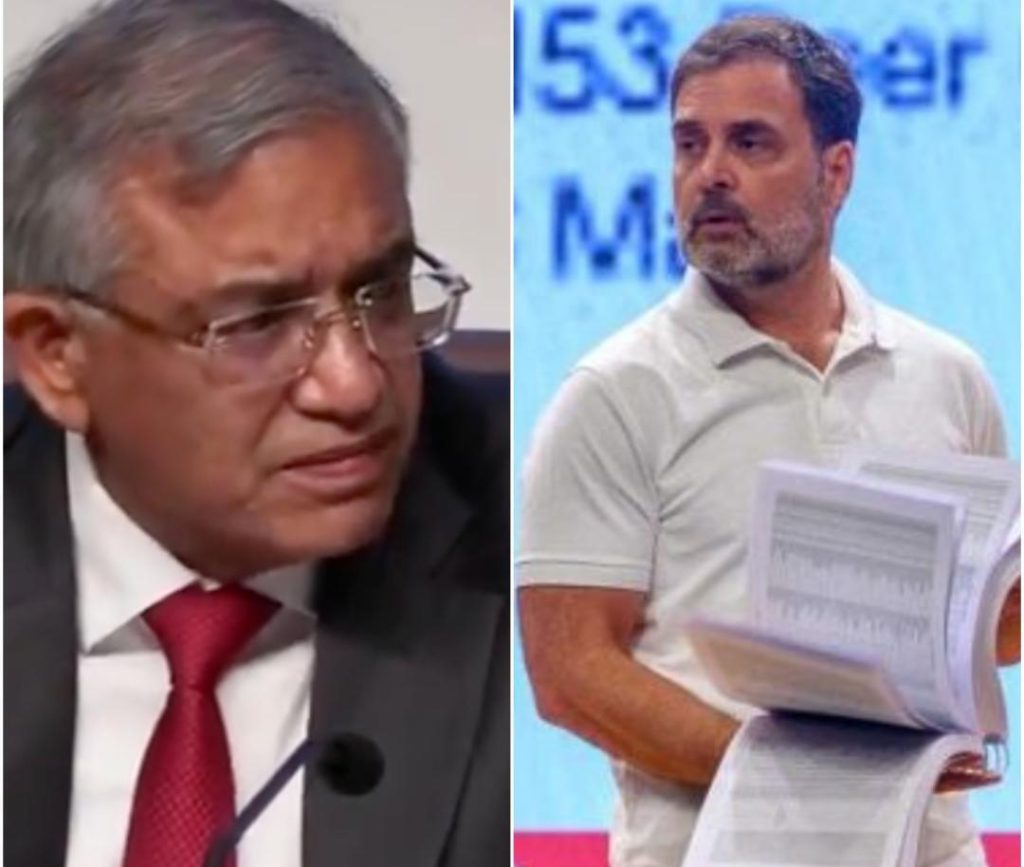
Vote Chori’ Phrase an Insult; Should We Share CCTV Footage of Mothers & Sisters Voting?: EC
In the midst of the ongoing election season, the debate over the sanctity of democratic processes has taken center stage. The Election Commission of India (EC) has been facing flak from various quarters, with some leaders questioning the transparency of the electoral process. Amidst this controversy, Chief Election Commissioner (CEC) Gyanesh Kumar has weighed in with a strong statement, criticizing the “vote chori” phrase that has been gaining traction in recent times.
For those who may not be aware, “vote chori” is a Hindi phrase that translates to “vote theft.” It is a term that has been used by Congress leader Rahul Gandhi to claim that elections are rigged in favor of the ruling party. However, CEC Kumar has taken strong exception to this phrase, calling it an insult to the Constitution.
Kumar’s remarks were made in response to a question about the demand for releasing surveillance footage from polling booths. There have been several calls from various quarters for the EC to share CCTV footage of voters casting their ballots, with the aim of ensuring transparency in the electoral process. However, Kumar was quick to point out that sharing such footage would be a violation of voters’ privacy.
“Should the Election Commission share the CCTV videos of any voter, including their mothers, daughters-in-law?” Kumar asked, emphasizing that the EC cannot compromise on the privacy of voters. He pointed out that the EC has already taken several measures to ensure transparency, including the use of VVPAT (Voter-Verified Paper Audit Trail) machines and the implementation of a robust surveillance system at polling booths.
Kumar’s statement has sparked a heated debate, with some arguing that the EC is being overly cautious in its approach to transparency. Others have pointed out that the demand for CCTV footage is not a new phenomenon, and that it has been a recurring issue in past elections.
However, Kumar’s stand has also received widespread support from several quarters. Many have pointed out that the EC has a responsibility to protect the privacy of voters, and that sharing CCTV footage would be a violation of that right. Others have argued that the EC has already taken sufficient measures to ensure transparency, and that releasing CCTV footage would not add any significant value to the electoral process.
So, is the “vote chori” phrase an insult to the Constitution? While opinions may vary on this issue, it is clear that Kumar’s statement has sparked a much-needed debate on the importance of respecting voters’ privacy in the electoral process.
In the past, there have been several instances where CCTV footage from polling booths has been leaked to the media, sparking controversy and undermining the confidence of voters in the electoral process. In such cases, the EC has faced criticism for not taking adequate measures to protect voters’ privacy.
In light of these concerns, Kumar’s statement is a welcome move. By emphasizing the importance of respecting voters’ privacy, the EC is sending a clear message that it is committed to protecting the rights of citizens in the electoral process.
Of course, the debate over the “vote chori” phrase is not just about protecting voters’ privacy. It is also about ensuring the integrity of the electoral process and upholding the values of democracy. In a democratic system, the right to vote is a fundamental right, and it is essential that the EC takes all necessary measures to ensure that this right is exercised freely and fairly.
In conclusion, while the “vote chori” phrase may be a catchy slogan for some, it is ultimately an insult to the Constitution and the democratic process. By respecting voters’ privacy and upholding the values of democracy, the EC is sending a clear message that it is committed to ensuring the integrity of the electoral process.






